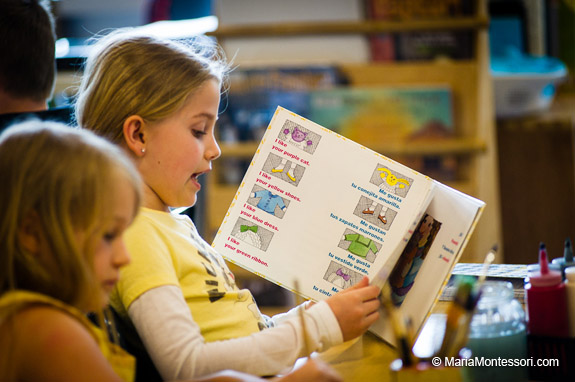
If you saw me walking across campus with a clipboard in my hand, I would probably be on my way to substitute in a primary (3- to 6-year-old) classroom. I keep a stack of blank slips of paper and a pencil on the clipboard because I know how much new readers simply love reading handwritten words and phrases. It is simply magic to them that I can have an idea in my head and make it manifest on a piece of paper and that they can decode it! It’s an excitement that all of the Bob Books and other primers in the world can never match.
Recently, for instance, I was subbing for the afternoon. Two of the 5-year-olds had just put a project away and were looking around for their next choice of work. One was slightly older and, as I happened to know, a more advanced reader. I pulled out my trusty clipboard and wrote a single phonetic word “rug” for the younger of the two. She sounded it out, “errrr-uhhhh-gggg, err-uh-gg, rug!” and looked at me expectantly. “Well,” I said, “can you place that label with the item it names?” With a giggle, she placed the label on the gray carpet beneath our feet.
Next, I wrote the word cup, and again she sounded it out before zipping off across the classroom to place it next to a cup on the counter. I would go on to write word after word with her reading and matching each label with joy and enthusiasm every time. Why? Because there is something magical about reading something hot off the press as it were, directly from my pencil to her mind.
I was already thinking ahead to the other phonetic labels I would write for her, words like “clock”, “map”, and “cactus” when I noticed the older girl was watching and waiting impatiently for a turn. “Oh, I have something a little different in mind for you,” I said, and wrote a phrase ‘the pencil.’ “I’d like you to bring me that.”
When she brought me a standard #2 writing pencil I exclaimed, “That is indeed a pencil! Thank you, but that’s not exactly the pencil I was thinking of,” and proceeded to add the word ‘red’ to the phrase. This time when she returned I let her know that, “That is a red pencil, but it is still not exactly the pencil I was thinking of,” and added the word ‘shortest’ to the phrase. This time when she returned I was finally able to reassure her, “Yes, that is exactly the pencil I was thinking of!”
“But, let’s read the phrase together, ‘the pencil red shortest’. Is that the way we usually would say it?” With a smile, she said “No way!” I used scissors to cut the phrase into pieces and, to her delight, rearranged it several ways, ‘pencil the red shortest’ and ‘shortest the pencil red’, eliciting a smile and a chuckle at each mistaken effort. “How would you arrange it then?” I asked. “The shortest red pencil!” she responded and arranged the words in their proper order.
I went on to play this game with her for the next half hour. She didn’t realize it, because I never actually used the word, but in addition to reading practice, she was getting an experience of the function of the adjective. At the same time, I continued to write single-word phonetic labels for the younger girl. Both girls were engaged with reading work, and one with grammar work, but with a joy and enthusiasm that I surely don’t remember experiencing with either reading or grammar. That’s the power of a pencil and some slips of paper. It’s magic.